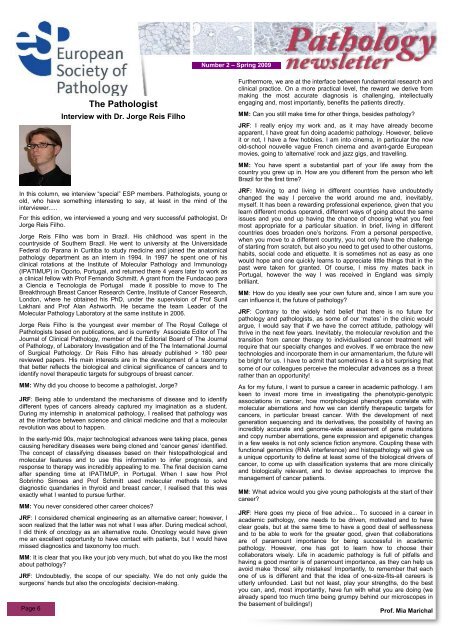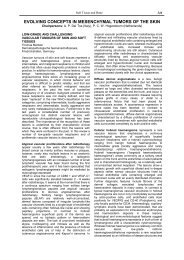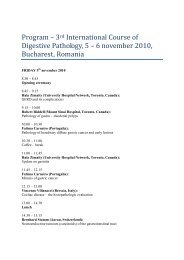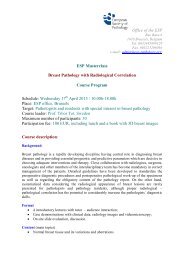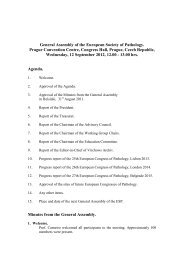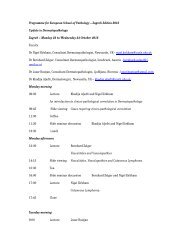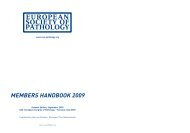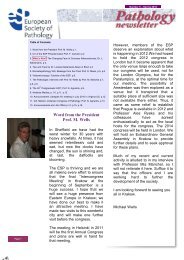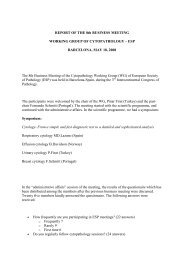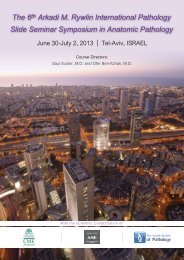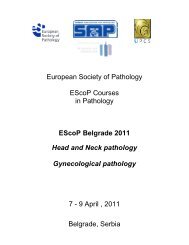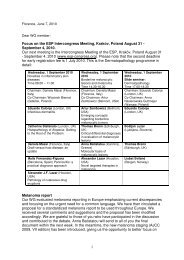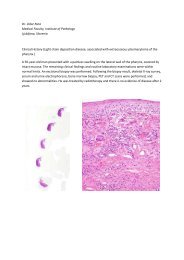Number 2 – Spring 2009 - European Society of Pathology
Number 2 – Spring 2009 - European Society of Pathology
Number 2 – Spring 2009 - European Society of Pathology
Create successful ePaper yourself
Turn your PDF publications into a flip-book with our unique Google optimized e-Paper software.
The Pathologist<br />
Interview with Dr. Jorge Reis Filho<br />
In this column, we interview “special” ESP members. Pathologists, young or<br />
old, who have something interesting to say, at least in the mind <strong>of</strong> the<br />
interviewer.....<br />
For this edition, we interviewed a young and very successful pathologist, Dr<br />
Jorge Reis Filho.<br />
Jorge Reis Filho was born in Brazil. His childhood was spent in the<br />
countryside <strong>of</strong> Southern Brazil. He went to university at the Universidade<br />
Federal do Parana in Curitiba to study medicine and joined the anatomical<br />
pathology department as an intern in 1994. In 1997 he spent one <strong>of</strong> his<br />
clinical rotations at the Institute <strong>of</strong> Molecular <strong>Pathology</strong> and Immunology<br />
(IPATIMUP) in Oporto, Portugal, and returned there 4 years later to work as<br />
a clinical fellow with Pr<strong>of</strong> Fernando Schmitt. A grant from the Fundacao para<br />
a Ciencia e Tecnologia de Portugal made it possible to move to The<br />
Breakthrough Breast Cancer Research Centre, Institute <strong>of</strong> Cancer Research,<br />
London, where he obtained his PhD, under the supervision <strong>of</strong> Pr<strong>of</strong> Sunil<br />
Lakhani and Pr<strong>of</strong> Alan Ashworth. He became the team Leader <strong>of</strong> the<br />
Molecular <strong>Pathology</strong> Laboratory at the same institute in 2006.<br />
Jorge Reis Filho is the youngest ever member <strong>of</strong> The Royal College <strong>of</strong><br />
Pathologists based on publications, and is currently Associate Editor <strong>of</strong> The<br />
Journal <strong>of</strong> Clinical <strong>Pathology</strong>, member <strong>of</strong> the Editorial Board <strong>of</strong> The Journal<br />
<strong>of</strong> <strong>Pathology</strong>, <strong>of</strong> Laboratory Investigation and <strong>of</strong> the The International Journal<br />
<strong>of</strong> Surgical <strong>Pathology</strong>. Dr Reis Filho has already published > 180 peer<br />
reviewed papers. His main interests are in the development <strong>of</strong> a taxonomy<br />
that better reflects the biological and clinical significance <strong>of</strong> cancers and to<br />
identify novel therapeutic targets for subgroups <strong>of</strong> breast cancer.<br />
MM: Why did you choose to become a pathologist, Jorge?<br />
JRF: Being able to understand the mechanisms <strong>of</strong> disease and to identify<br />
different types <strong>of</strong> cancers already captured my imagination as a student.<br />
During my internship in anatomical pathology, I realised that pathology was<br />
at the interface between science and clinical medicine and that a molecular<br />
revolution was about to happen.<br />
In the early-mid 90s, major technological advances were taking place, genes<br />
causing hereditary diseases were being cloned and ‘cancer genes’ identified.<br />
The concept <strong>of</strong> classifying diseases based on their histopathological and<br />
molecular features and to use this information to infer prognosis, and<br />
response to therapy was incredibly appealing to me. The final decision came<br />
after spending time at IPATIMUP, in Portugal. When I saw how Pr<strong>of</strong><br />
Sobrinho Simoes and Pr<strong>of</strong> Schmitt used molecular methods to solve<br />
diagnostic quandaries in thyroid and breast cancer, I realised that this was<br />
exactly what I wanted to pursue further.<br />
MM: You never considered other career choices?<br />
JRF: I considered chemical engineering as an alternative career; however, I<br />
soon realized that the latter was not what I was after. During medical school,<br />
I did think <strong>of</strong> oncology as an alternative route. Oncology would have given<br />
Page 6<br />
me an excellent opportunity to have contact with patients, but I would have<br />
missed diagnostics and taxonomy too much.<br />
MM: It is clear that you like your job very much, but what do you like the most<br />
about pathology?<br />
JRF: Undoubtedly, the scope <strong>of</strong> our specialty. We do not only guide the<br />
surgeons’ hands but also the oncologists’ decision-making.<br />
Page 6<br />
<strong>Number</strong> 2 <strong>–</strong> <strong>Spring</strong> <strong>2009</strong><br />
Furthermore, we are at the interface between fundamental research and<br />
clinical practice. On a more practical level, the reward we derive from<br />
making the most accurate diagnosis is challenging, intellectually<br />
engaging and, most importantly, benefits the patients directly.<br />
MM: Can you still make time for other things, besides pathology?<br />
JRF: I really enjoy my work and, as it may have already become<br />
apparent, I have great fun doing academic pathology. However, believe<br />
it or not, I have a few hobbies. I am into cinema, in particular the now<br />
old-school nouvelle vague French cinema and avant-garde <strong>European</strong><br />
movies, going to ‘alternative’ rock and jazz gigs, and travelling.<br />
MM: You have spent a substantial part <strong>of</strong> your life away from the<br />
country you grew up in. How are you different from the person who left<br />
Brazil for the first time?<br />
JRF: Moving to and living in different countries have undoubtedly<br />
changed the way I perceive the world around me and, inevitably,<br />
myself. It has been a rewarding pr<strong>of</strong>essional experience, given that you<br />
learn different modus operandi, different ways <strong>of</strong> going about the same<br />
issues and you end up having the chance <strong>of</strong> choosing what you feel<br />
most appropriate for a particular situation. In brief, living in different<br />
countries does broaden one’s horizons. From a personal perspective,<br />
when you move to a different country, you not only have the challenge<br />
<strong>of</strong> starting from scratch, but also you need to get used to other customs,<br />
habits, social code and etiquette. It is sometimes not as easy as one<br />
would hope and one quickly learns to appreciate little things that in the<br />
past were taken for granted. Of course, I miss my mates back in<br />
Portugal, however the way I was received in England was simply<br />
brilliant.<br />
MM: How do you ideally see your own future and, since I am sure you<br />
can influence it, the future <strong>of</strong> pathology?<br />
JRF: Contrary to the widely held belief that there is no future for<br />
pathology and pathologists, as some <strong>of</strong> our ‘mates’ in the clinic would<br />
argue, I would say that if we have the correct attitude, pathology will<br />
thrive in the next few years. Inevitably, the molecular revolution and the<br />
transition from cancer therapy to individualised cancer treatment will<br />
require that our specialty changes and evolves. If we embrace the new<br />
technologies and incorporate them in our armamentarium, the future will<br />
be bright for us. I have to admit that sometimes it is a bit surprising that<br />
some <strong>of</strong> our colleagues perceive the molecular advances as a threat<br />
rather than an opportunity!<br />
As for my future, I want to pursue a career in academic pathology. I am<br />
keen to invest more time in investigating the phenotypic-genotypic<br />
associations in cancer, how morphological phenotypes correlate with<br />
molecular aberrations and how we can identify therapeutic targets for<br />
cancers, in particular breast cancer. With the development <strong>of</strong> next<br />
generation sequencing and its derivatives, the possibility <strong>of</strong> having an<br />
incredibly accurate and genome-wide assessment <strong>of</strong> gene mutations<br />
and copy number aberrations, gene expression and epigenetic changes<br />
in a few weeks is not only science fiction anymore. Coupling these with<br />
functional genomics (RNA interference) and histopathology will give us<br />
a unique opportunity to define at least some <strong>of</strong> the biological drivers <strong>of</strong><br />
cancer, to come up with classification systems that are more clinically<br />
and biologically relevant, and to devise approaches to improve the<br />
management <strong>of</strong> cancer patients.<br />
MM: What advice would you give young pathologists at the start <strong>of</strong> their<br />
career?<br />
JRF: Here goes my piece <strong>of</strong> free advice... To succeed in a career in<br />
academic pathology, one needs to be driven, motivated and to have<br />
clear goals, but at the same time to have a good deal <strong>of</strong> selflessness<br />
and to be able to work for the greater good, given that collaborations<br />
are <strong>of</strong> paramount importance for being successful in academic<br />
pathology. However, one has got to learn how to choose their<br />
collaborators wisely. Life in academic pathology is full <strong>of</strong> pitfalls and<br />
having a good mentor is <strong>of</strong> paramount importance, as they can help us<br />
avoid make ‘those’ silly mistakes! Importantly, to remember that each<br />
one <strong>of</strong> us is different and that the idea <strong>of</strong> one-size-fits-all careers is<br />
utterly unfounded. Last but not least, play your strengths, do the best<br />
you can, and, most importantly, have fun with what you are doing (we<br />
already spend too much time being grumpy behind our microscopes in<br />
the basement <strong>of</strong> buildings!)<br />
Pr<strong>of</strong>. Mia Marichal


